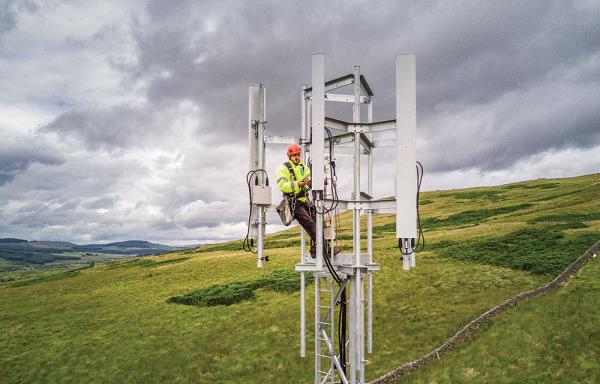09 February 2018

The operator that will be the most affected by Ofcom’s proposed spectrum caps is BT/EE which already holds about 42 per cent of all available cellular frequencies. PHOTO: EE
Ofcom has announced plans to go ahead with auctioning spectrum in the 2.3GHz and 3.4GHz bands despite pending legal action by Three UK.
While the 2.3GHz frequencies can be deployed immediately (after they have been awarded to operators) to improve mobile services for customers, 3.4GHz spectrum can be used for future 5G networks.
Ofcom had planned to hold the auction in autumn 2017 but was delayed by litigation brought by Three and BT/EE.
Earlier last year in July, the regulator said it was going to impose caps on the amount of new spectrum that any single operator could acquire. It proposed a cap of 255MHz on the amount of mobile spectrum that was immediately usable after the auction, and then a total cap of 340MHz per operator on overall mobile spectrum following the sale. This latter cap will mean no company can possess more than 37 per cent of all mobile spectrum.
The operator that will be most affected by this is BT/EE which already holds about 42 per cent of all available spectrum. It argued that the cap limits the extent to which it can expand in the future by seeking to acquire extra frequencies. At the same time, it said rivals will have the chance to win a greater share of the airwaves.
However, Three believes the auction rules are too generous to BT/EE. In its submission to Ofcom during the consultation stage, it argued that BT/EE should not be allowed to hold more than 30 per cent of the total spectrum. While Three was prepared to accept the ultimate figure of 37 per cent, it claimed that the regulator gave BT/EE “considerable leeway and tolerance” to possess more than 37 per cent of the spectrum before it finally had to succumb to the cap.
Following an expedited court process recognising the strong public interest in proceeding with the auction, the High Court upheld Ofcom’s decision and dismissed both claims on 20 December 2017. BT/EE is reportedly no longer pursuing its case, but Three has now applied to the Court of Appeal which has expedited matters and will hear the case on 13 and 14 February 2018.
In a press statement released on 17 January, Ofcom said: “The litigation by Three is continuing to delay access to the spectrum and the benefits to consumers and businesses that can flow from it. We are keen to ensure that we can move as quickly as possible to hold the auction once the judgment of the Court of Appeal has been given.”
As a result, the regulator has decided to go ahead with the auction. It now plans to publish the regulations and guidance for potential bidders on how to take part in the sale on 31 January.
But the formal process of qualifying bidders won’t begin until after the Court of Appeal’s decision is announced, and all parties know whether Ofcom’s decision to impose an overall spectrum cap at 340MHz is upheld.










